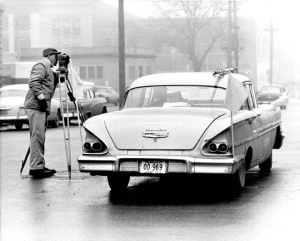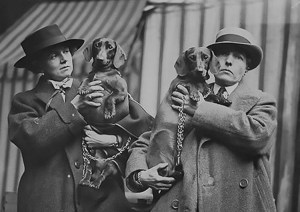The correct answer to this question was a mother and a wife. The second best answer was a doctor, a lawyer, or a rocket scientist (or more realistically a nurse, a librarian, or a teacher). I knew not to answer a baseball player, a fireman, or a cowboy.
I didn’t know what happened to kids like me, but I wasn’t ever going to be a wife and a mother. To be safe, I said I wanted to be a lawyer (we watched Perry Mason on TV). Then I read The Fountainhead in high school and decided to become an architect. It was all based on image, not innate skill. I didn’t question why all my role models were men.
I enrolled in an architecture program but I was no Howard Roark. I was too sloppy to pass the introductory drafting class. I transferred to civil engineering because it had a promising job board. I pictured myself on a construction site wearing Carhartt canvas pants and Red Wing boots. I aced my classes. I also came out as butch. It was the first identity that I could identify with. It seemed natural, as if it had been waiting for me all along.
The term butch only came into usage in the 1940’s. Regardless of the label, the religious, legal, medical, and psychiatric authorities have pathologized, criminalized, and demonized people like me since they realized we existed. I say people like me, because even though we’ve been around forever, the words used to describe us keep evolving. The bigotry seems to stay the same.
Since biblical times, words existed for the sexual acts between people of the same-sex (e.g. sodomy, buggery, or tribadism), but until the mid 1800’s there were few words to specifically identify the kinds of people who committed these acts. The terms homosexual and heterosexual were first published in 1880 (by Károly Mária Kertbeny). Transvestite was used by Magnus Hirschfeld in 1910, and transsexual in 1949 by David Oliver Cauldwell. I’ve never identified with any of those terms.
I don’t know what choices I would have made if butch didn’t exist. Would I invent it? Would I go underground and try to pass as a man? Wear women’s clothing in public, but dress as a man at home? Cohabit in a Boston Marriage? Join a religious order? Suppress everything and marry a man? Have romantic friendships? Would I be institutionalized? Would I try to kill myself? I do not judge those who came before me.
They lived quietly and did not write books about how they lived their lives (Radclyffe Hall being one of the exceptions). What was reported in the press, after their death or discovery, was often lurid or prurient. We do not know their true gender identities and sexual identities. I don’t want to appropriate their stories or retroactively try to fit 21st century labels onto them, but I can picture myself in their boots.
Slang and labels come into fashion and go out of fashion. It is difficult to write about myself without using my 2016 vocabulary. Today, I’d say I was assigned female at birth (AFAB) but identify as queer, non-binary, and transgender or as a transmasculine butch.
I use labels, but I believe in the whole spectrum, not just my little part of it. I don’t let labels dictate what I can or can’t do. Labels helped me untangle the confusing mess of my gender and sexuality. Labels help us find our niche. Labels help us organize and come together to fight for our rights, to defeat the bigots, and live to tell the story.
Notes: I was thinking about how fast terminology changes when I read Shawn’s post on labels last week. I started looking for timelines of what terms were used when, and instead found this interesting summary of terms in the OED (The Oxford English Dictionary) for women who have sex with women.
Lastly, I was looking for some information on “Boston Marriages” and found this article in The Atlantic on 19th century friendships (But Were They Gay?).



I love language. The OED etymology is fascinating. ‘Carpet muncher’ is a funny one to me; it is akin to ‘kneeknocker’ among childcare workers, with the former being crawlers and the latter being waddlers. And I find I rather like the term ‘fricatrice’. Not the time-period-relevant censury connotations, but just the <iword. It leaves a delightful taste in my mouth, simply for being so much fun to say. 🙂
LikeLiked by 1 person
I obviously didn’t use my emphasis marks correctly. “<iword" was supposed to be just plain "word" but italicized.
And I don't think I've yet figured out what I want to be when I grow up. 🙂
LikeLiked by 1 person
Glad you enjoyed the OED reference. I have a friend named Beatrice who is a fricatrice. Fricatrice would also make a good name for a pet. Now I have to go read Emma Donoghue’s book on British Lesbianism from 1668-1801.
LikeLiked by 2 people
Another book added to the ever-growing list! Thanks.
LikeLiked by 1 person
Have you read Odd Girls and Twilight Lovers by Lilian Faderman? It’s an excellent book on lesbian history.
LikeLiked by 1 person
I read Surpassing the Love of Men way back, but not Odd Girls. I’ll add it to my list, it looks good. Thanks.
LikeLiked by 1 person
I can send it to you in PDF if you’re interested.
LikeLiked by 1 person
That would be great. You can sent it to jamierayblog@ gmail.com
LikeLike
Sent!
LikeLike
For a long time, I used to use this as my sig line when posting to forums:
Just your average transgender non-op transsexual
crossdressing genderqueer transgenderist geek.
Aside from ‘geek’, these were all gendered labels others had, at one time or another, used to describe me. Depending on the day of the week, phase of the moon, etc. – any one of more of these *might* be appropriate. I used this because some of the labels (at the time) were seen by some as excluding others, e.g.: transsexuals didn’t cross-dress, genderqueers weren’t trans, non-op wasn’t even a real thing… It exemplified the mess that is labeling transpeople (or anyone for that matter) and expecting them to ‘fit’ in one category.
These days, I just use trans / non-binary. *So* much less wordy… 🙂
LikeLiked by 3 people
Thank you for commenting! I prefer labels to include rather than exclude, and get very pissed off when anyone denigrates anything less than passing binary transition. I am very partial to trans as a term. At some point I am going to formulate a post that goes into how I feel about the medical/psych establishment deciding what “transition” is, and the emphasis on passing, hormone treatment, and surgery – one size fits all – even if one does not require that to feel “whole”.
LikeLike
I do often wonder what my life would’ve been like had I been born 20, 50, or 100 years before. Would I have fought back, or accepted my circumstances? Gotten in trouble, or found a way around it? Who knows….
LikeLiked by 1 person
You have to respect the chutzpah of the ones who figured out a way to live unconventionally or by cross-dressing/passing.
LikeLiked by 1 person
Sorry I’m late to comment here…been kind of busy. Thanks for the link to my post.
I always told people I wanted to be a farmer when asked as a child because I wanted to be like my uncles (my role models) but was always told that I would have to marry a farmer. I still kind of would like to be a farmer, but don’t have the energy for it anymore. Still, I enjoy riding around my yard on my lawn tractor. I guess it fills the need for me.
You know I struggle a lot with labels. I guess I’ve settled on transmasculine butch or trans male for now. I’ve never felt much if any connection to the lesbian labels out there, though I did use dyke or butch dyke a lot when I was younger and I think sapphist is a pretty cool label. Maybe I’ll roll that into my trans label somehow. Something like transmasculine sapphist butch dude.
LikeLiked by 1 person
Sappho was a right on butch dude! (Apologies to Sidney Abott and Barbara J. Love circa 1972).
LikeLiked by 1 person
I often wonder how I would be living if I hadn’t found the language to describe my non binary, trans masculine identity. So many people say we don’t need labels but it is so powerful to be able to connect with people who identify in a similar way to you. It’s powerful to meet trans* people who don’t want to transition in the traditional way. My most recent blog is about trans* bodies and transition actually and your words resonated so much when I found them.
LikeLike